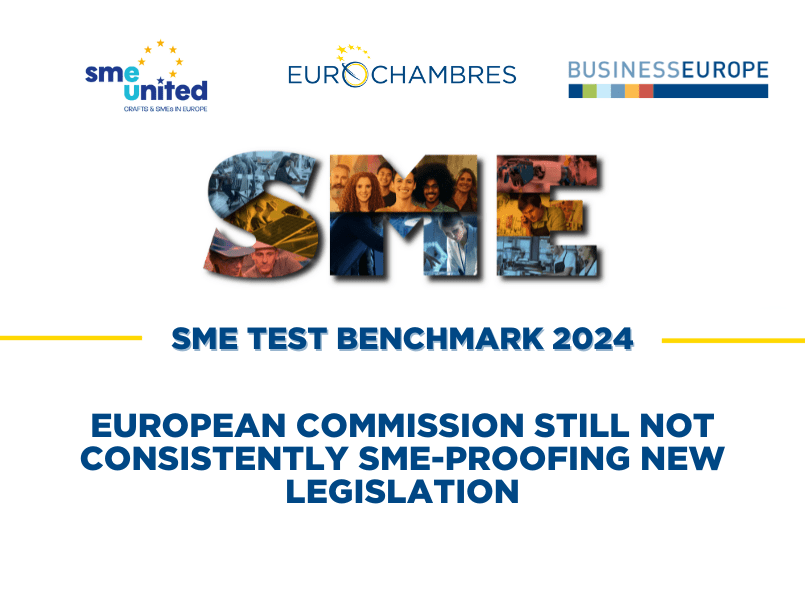European Commission still not consistently SME-proofing new legislation
New analysis by three leading European business associations reveals that the application of the European Commission’s ‘SME Test’ methodology across Commission services remains inconsistent. With simplification and the reduction of the regulatory burden for SMEs rightly identified as key factors in the new EU mandate competitiveness agenda, BusinessEurope, Eurochambres and SMEunited call for a more rigorous approach to gauging the impact of new legislation on SMEs.
Following the joint analysis in 2022, BusinessEurope, Eurochambres, and SMEunited have once again joined forces for a comprehensive assessment of the SME Test application across the European Commission services.
This year’s analysis shows some progress while still underlining the findings of the 2022 report: the SME Test is still neither systematically nor consistently applied across the European Commission services. To reach this conclusion, 23 impact assessments (IAs) were analysed on the basis of the European Commission better regulation guidelines. The three associations call for concrete actions in line with the strong political commitment to better support SMEs. While the analysis points to some positive elements, areas for improvement remain.
On a positive note, the analysis shows that a vast majority of consultations were held in all EU official languages, other consultation methods – other than the traditional open public consultation – were often employed, and, in 80% of cases, SMEs’ views were fairly represented.
However, the report also identifies areas for improvement. These include respecting the 12-week consultation period and providing a granular presentation of the information gathered during the consultations. Findings also show that quantification of the impact on SMEs was carried out only for 56% of IAs and that only 30% of legislative initiatives had a dedicated SME Test chapter.
With the report, presented at the EU SME Assembly in Budapest, the three organisations call on the upcoming Commission to take up their political commitment to better regulation and burden reduction, and suggest several recommendations for better SME policymaking.
BusinessEurope Director General Markus J. Beyrer said: “Reducing the regulatory and administrative burden for businesses – especially SMEs – must be a top priority on the European institutions’ agenda in the new legislative term. If Europe is to become a true SME superpower, it must ensure that its better regulation genuinely supports these businesses. The challenges outlined in our report demand urgent actions from EU institutions to create a smarter, more supportive regulatory environment for SMEs across Europe.”
Eurochambres Chief Executive Officer Ben Butters added that: “As a new EU term begins, the Commission and co-legislators must prioritize the needs of European SMEs with a new approach to policymaking. While some results on the SME Test application are encouraging – compared to previous editions – there is still considerable room for improvement. Business organisations are fully committed to supporting the Commission services with this crucial task, in the interest of our SMEs”.
SMEunited Secretary General Véronique Willems concluded that: “The vast majority of legislative initiatives in the Commission’s work programme are relevant to SMEs, while only around half of the impact assessments substantially focus on SMEs. Impact assessments must better reflect the “Think Small First” principle, ensuring legislation is feasible for the smallest companies and cumulative and indirect impact is tackled.”
The full SME Test Benchmark Report is available here.
